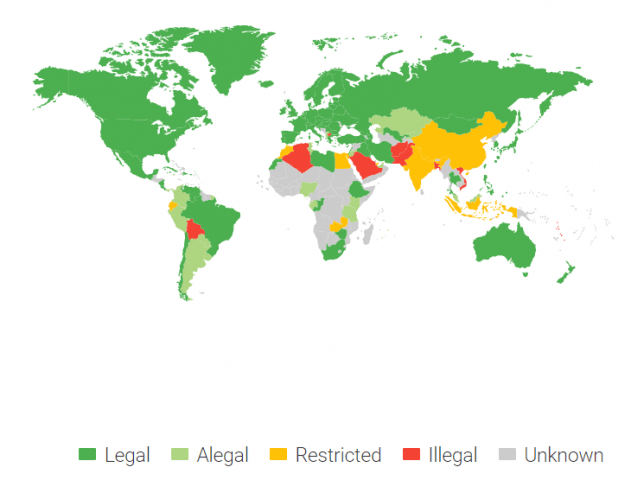Table of Contents
Bitcoin has become the new buzzword among the digital financial markets. One of the striking features which makes it unique than the conventional currency is that it is decentralized. Bitcoin does not need to be passed via an intermediary or backed or managed by any central institutions like banks. Cryptocurrency or Bitcoin is being managed and recorded on a blockchain network which makes the transaction transparent and secured, thereby Bitcoin is better than conventional currency. As the Bitcoin started getting popular, regulatory authorities of countries all across the world seemed to be confused in handling the currency. Some countries legalized it while others made the Bitcoin illegal. While some other restricted and regulated the crypto markets in their country. In this article, let us explore the response to- Should Bitcoin be legalized?
Should Bitcoin Be Legalized? | Should Bitcoin Be Illegalised?
After reading about the lucrative profits associated with investment in Bitcoins, are you thinking of buying some of them? Or at the time of crisis, you want to sell or spend them? I would recommend checking the status of the cryptocurrency in your country.

If Bitcoin Is Legalised!

Amid the chaotic financial environment, where most of the fiat currencies are evaluated on the basis of the behavior of the US dollar, rates of crude oil, and the social and political conditions of the country, some of the countries took the decision to legalize the controversial Bitcoin. More than 100 countries (till 2020) including Japan, Singapore, Switzerland, Malta, and many more had recognized the status of Bitcoin and legalized it. As reported by many of the nations, legalizing the Bitcoin is helping them to revolutionize the financial system in the following ways:
- Lower down the need for infrastructure as Bitcoin follows a decentralized model based on clear understanding blockchain technology where the coins are mined or the transaction is verified by the participants or miners on their systems connected to the network, and the transaction gets completed. There is no need to set up the huge physical infrastructure or maintain the manpower, and the money saved can be utilized to improve the health and education sector.
- The risk of leakage of personal information associated with buyers and sellers is minimized as the blockchain network assures anonymity by transferring the payment from seller to receiver wallet. Thereby, database management is no more a tedious job and the risk of misuse of data can be reduced.
- Counterfeiting of the currency is one of the major issue which is being faced by the nations as this problem leads to financing terrorism, illicit activities, and many more. Bitcoin can prove as the solution as it is immutable. Each transaction is recorded on blockchain so any alteration will inform all the nodes or systems involved with that particular block.
- Smooth cross border transaction with less transaction time and lower transaction fees is possible with Bitcoins. By strengthening the digital infrastructure, cryptocurrency can easily be sent and received in every corner of the country or world.
- Bitcoin transaction deploys cryptographic techniques to successfully encrypt the information related to the transaction amount, wallet addresses, and other data which need to be filled during the transaction. Cryptography ensures the security of the network and safeguard the money from stealing or data leakage.
According to the nations who have legalized the digital currency are exploring more of the benefits to enhance the experience of their citizens while confirming the payment. But, should other countries legalize Bitcoin?
If Bitcoin Is illegalized!

Bitcoins are still seen as the doubtful currency in many of the nations. Even in some of the nations, you might be imprisoned if you withhold the coins or are involved in the transaction of cryptocurrency. While in some others, the government authorities are still struggling to define the legal terms of Bitcoin in their jurisdiction and ended up in making it illegal. Saudi Arabia, Algeria, Vietnam, Qatar, and many more countries banned the Bitcoins due to one or the other reasons as stated below:
- The decentralized nature of cryptocurrency makes the government skeptical and makes them feel like losing control over the financial system. Besides the concern of the protection of citizens, authorities are also concerned about the notorious crypto exchanges involved in promoting a decentralized payment structure.
- Semi anonymous behavior of the transaction associated with Bitcoins is a big question mark to the government. Anonymity can result in money laundering, tax evasion, and creating the haven for black markets as per the nations who banned the digital currency.
- Tax evasion is also one of the main bones of contention for the authorities. As the transaction can be traced but not the amount which is being transacted, this can result in evading the taxes and also make it difficult for the legal and financial system to form the laws in the first place.
- Money can be laundered easily with the help of cryptocurrency or Bitcoin. A person needs two crypto accounts to launder the money, and the transfer looks perfectly legitimate. The lack of central authority, proper regulations, and anonymity can help in easy evasion.
According to me, making the currency completely illegal deprives the countries from utilizing the potential benefits of the cryptocurrency. Some of the features can make the system operational in a hassle-free manner.
Summing Up
Should Bitcoin be legalized? Or Should Bitcoin be illegalized? Some of the countries have found the middle path of creating a regulatory environment. They are seeking to utilize the potential benefits of the cryptocurrency while providing the structure to safeguard investors. Nations like the United States of America, countries of the European Union, Egypt, Indonesia, and many more have restricted the environment but did not outrightly treat the trade in Bitcoin as illegal. Countries are constantly strengthening their digital payment infrastructure and providing a favorable environment for Bitcoin transactions while at the same time assures the rules related to anti-money laundering, tax evasion, financing terrorism can be properly followed. Predicting the future of Bitcoin is might be difficult at this moment of economic slowdown, the future of cryptocurrency regulation is difficult to comment on but it is certain to stay and revolutionize the digital payment infrastructure.

